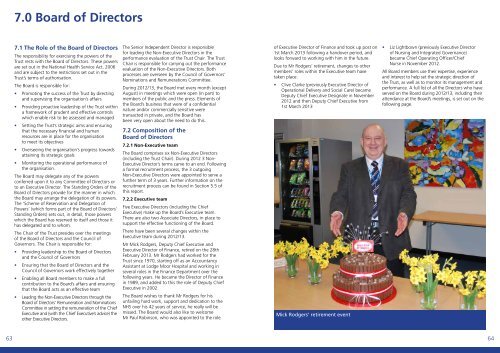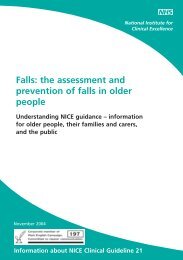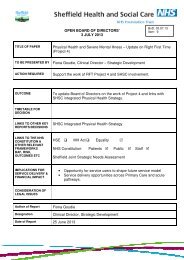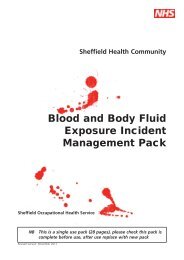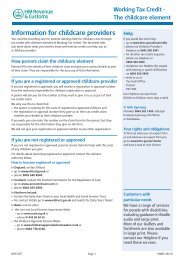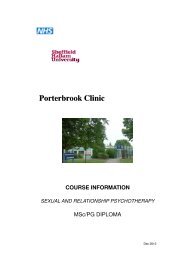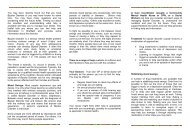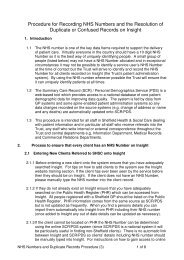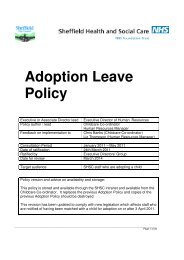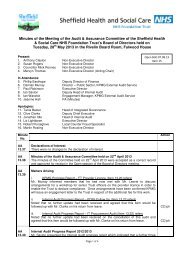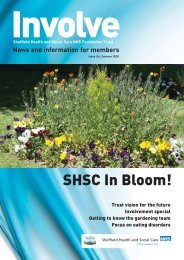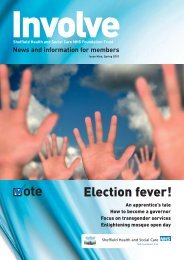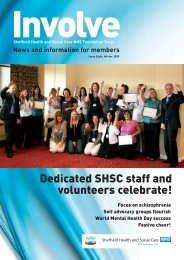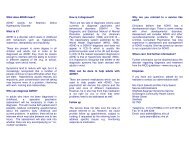Item 8 - Sheffield Health and Social Care
Item 8 - Sheffield Health and Social Care
Item 8 - Sheffield Health and Social Care
Create successful ePaper yourself
Turn your PDF publications into a flip-book with our unique Google optimized e-Paper software.
7.0 Board of Directors7.1 The Role of the Board of DirectorsThe responsibility for exercising the powers of theTrust rests with the Board of Directors. These powersare set out in the National <strong>Health</strong> Service Act, 2006<strong>and</strong> are subject to the restrictions set out in theTrust’s terms of authorisation.The Board is responsible for:• Promoting the success of the Trust by directing<strong>and</strong> supervising the organisation’s affairs• Providing proactive leadership of the Trust withina framework of prudent <strong>and</strong> effective controlswhich enable risk to be assessed <strong>and</strong> managed• Setting the Trust’s strategic aims <strong>and</strong> ensuringthat the necessary financial <strong>and</strong> humanresources are in place for the organisationto meet its objectives• Overseeing the organisation’s progress towardsattaining its strategic goals• Monitoring the operational performance ofthe organisation.The Board may delegate any of the powersconferred upon it to any Committee of Directors orto an Executive Director. The St<strong>and</strong>ing Orders of theBoard of Directors provide for the manner in whichthe Board may arrange the delegation of its powers.The ‘Scheme of Reservation <strong>and</strong> Delegation ofPowers’ (which forms part of the Board of Directors’St<strong>and</strong>ing Orders) sets out, in detail, those powerswhich the Board has reserved to itself <strong>and</strong> those ithas delegated <strong>and</strong> to whom.The Chair of the Trust presides over the meetingsof the Board of Directors <strong>and</strong> the Council ofGovernors. The Chair is responsible for:• Providing leadership to the Board of Directors<strong>and</strong> the Council of Governors• Ensuring that the Board of Directors <strong>and</strong> theCouncil of Governors work effectively together• Enabling all Board members to make a fullcontribution to the Board’s affairs <strong>and</strong> ensuringthat the Board acts as an effective team• Leading the Non-Executive Directors through theBoard of Directors’ Remuneration <strong>and</strong> NominationsCommittee in setting the remuneration of the ChiefExecutive <strong>and</strong> (with the Chief Executive’s advice) theother Executive Directors.The Senior Independent Director is responsiblefor leading the Non-Executive Directors in theperformance evaluation of the Trust Chair. The TrustChair is responsible for carrying out the performanceevaluation of the Non-Executive Directors. Bothprocesses are overseen by the Council of Governors’Nominations <strong>and</strong> Remunerations Committee.During 2012/13, the Board met every month (exceptAugust) in meetings which were open (in part) tomembers of the public <strong>and</strong> the press. Elements ofthe Board’s business that were of a confidentialnature <strong>and</strong>/or commercially sensitive weretransacted in private, <strong>and</strong> the Board hasbeen very open about the need to do this.7.2 Composition of theBoard of Directors7.2.1 Non-Executive teamThe Board comprises six Non-Executive Directors(including the Trust Chair). During 2012 3 Non-Executive Director’s terms came to an end. Followinga formal recruitment process, the 3 outgoingNon-Executive Directors were appointed to serve afurther term of 3 years. Further information on therecruitment process can be found in Section 5.5 ofthis report.7.2.2 Executive teamFive Executive Directors (including the ChiefExecutive) make up the Board’s Executive team.There are also two Associate Directors, in place tosupport the effective functioning of the Board.There have been several changes within theExecutive team during 2012/13.Mr Mick Rodgers, Deputy Chief Executive <strong>and</strong>Executive Director of Finance, retired on the 28thFebruary 2013. Mr Rodgers had worked for theTrust since 1970, starting off as an AccountancyAssistant at Lodge Moor Hospital <strong>and</strong> working inseveral roles in the Finance Department over thefollowing years. He became the Director of Financein 1989, <strong>and</strong> added to this the role of Deputy ChiefExecutive in 2002.The Board wishes to thank Mr Rodgers for hisunfailing hard work, support <strong>and</strong> dedication to theNHS over his 42 years of service, he really will bemissed. The Board would also like to welcomeMr Paul Robinson, who was appointed to the roleof Executive Director of Finance <strong>and</strong> took up post on1st March 2013 following a h<strong>and</strong>over period, <strong>and</strong>looks forward to working with him in the future.Due to Mr Rodgers’ retirement, changes to othermembers’ roles within the Executive team havetaken place:• Clive Clarke (previously Executive Director ofOperational Delivery <strong>and</strong> <strong>Social</strong> <strong>Care</strong>) becameDeputy Chief Executive Designate in November2012 <strong>and</strong> then Deputy Chief Executive from1st March 2013Mick Rodgers’ retirement event• Liz Lightbown (previously Executive Directorof Nursing <strong>and</strong> Integrated Governance)became Chief Operating Officer/ChiefNurse in November 2012.All Board members use their expertise, experience<strong>and</strong> interest to help set the strategic direction ofthe Trust, as well as to monitor its management <strong>and</strong>performance. A full list of all the Directors who haveserved on the Board during 2012/13, including theirattendance at the Board’s meetings, is set out on thefollowing page.6364


